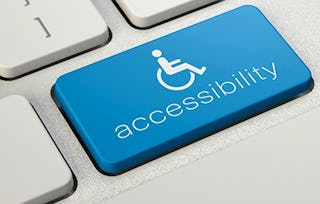Worldwide millions of children are not able to fully participate in schooling, and this is especially a problem for children with disabilities. In this course, we explore the support that teachers need in order to meet the needs of children with severe to profound hearing, visual and intellectual disabilities. We consider how this can be done by talking with a range of experts - from teachers to activists - about inclusive education as well as sharing experiences of education.

Disability Inclusion in Education: Building Systems of Support

Disability Inclusion in Education: Building Systems of Support

Instructor: Judith McKenzie
35,644 already enrolled
Included with
(851 reviews)
What you'll learn
To use disability inclusion principles to describe the support needs of learners with disabilities.
To identify the systemic support structures available to teachers within the education system.
To recognise the impairment specific support needs of learners with disabilities.
Skills you'll gain
- Student Support and Services
- Instructional Strategies
- Instructional Design
- Working With Children
- Curriculum Development
- Social Justice
- Teaching
- Diversity Equity and Inclusion Initiatives
- Educational Materials
- Visual Impairment Education
- Differentiated Instruction
- Disabilities
- Diversity Awareness
- Developmental Disabilities
- Pedagogy
- Special Education
Details to know

Add to your LinkedIn profile
See how employees at top companies are mastering in-demand skills

There are 5 modules in this course
This week, we consider what disability inclusion means by exploring different models of disability as well as disability rights and policies. Drawing from the history of special and inclusive education we look at how mainstream schools can move towards becoming inclusive schools and how special education can fit into an inclusive education framework. At the end of this week, there is a graded quiz, where you can check your understanding of the key concepts. Every week, you are invited to reflect on the topics in the discussions where you can talk with others about what this means for your practice as an educator.
What's included
8 videos3 readings3 assignments2 discussion prompts
This week focuses on teacher empowerment and what teachers need to know to better support learners with disabilities. We begin by sharing with you what the Teacher Empowerment for Disability Inclusion (TEDI) project's research findings revealed about teachers’ educational needs. This week we hear powerful personal testimonies of individuals living with disabilities about their schooling which highlights the importance of the empowered teacher in their lives when they were learners. At the end of this week, there is a graded peer review and opportunity for reflection through discussion.
What's included
8 videos5 readings1 peer review1 discussion prompt
This week focuses on the systemic support structures that are available to teachers and educators in order to support learners with impairments. A former teacher and two district officers share their experiences of support structures and the roles they had to shape and implement policies within the spaces they found themselves in. We will also explore some insights from the TEDI research project on how teachers feel they are supported. At the end of the week, there is a graded quiz and optional Honours Peer Review assignment where you can explore these topics further.
What's included
9 videos2 readings3 assignments1 peer review2 discussion prompts
This week discusses how to make the curriculum accessible for all - particularly focusing on those with severe to profound disabilities. This includes understanding some of the causes of specific impairments (hearing, visual and intellectual) and their impacts on learning. We also have the pleasure of learning from experts who outline which principles and approaches can be adopted to best support learners with these specific impairments. At the end of the week, there is a graded quiz where you can test your knowledge of what you have learnt, and through a discussion reflect on your own teaching practices.
What's included
10 videos1 reading4 assignments1 discussion prompt
In this week, the concept of universal design for learning is introduced as a way of approaching teaching and learning to tackle any problems of exclusion from education. Building on the lectures from last week, this week, experienced teachers describe in some detail what teaching strategies they use in their classrooms to include and support learners with specific impairments. Finally, in the peer review assignment you will be given the chance to create your own plan to support a learner, using the universal design principles.
What's included
7 videos2 readings1 peer review1 discussion prompt
Instructor

Offered by
Explore more from Education
 Status: Preview
Status: PreviewUniversity of Cape Town
 Status: Preview
Status: PreviewUniversity of Pittsburgh
 Status: Preview
Status: PreviewKnowledge Accelerators
 Status: Preview
Status: PreviewUniversity of Cape Town
Why people choose Coursera for their career

Felipe M.

Jennifer J.

Larry W.

Chaitanya A.
Learner reviews
- 5 stars
89.18%
- 4 stars
8.46%
- 3 stars
1.52%
- 2 stars
0.35%
- 1 star
0.47%
Showing 3 of 851
Reviewed on Sep 4, 2024
I had the best online course experience with this course everything was well sorted. I will recommend this course to my fellow colleagues (Educators) so that they may also gain more knowledge.
Reviewed on Oct 12, 2019
Outstanding: relevant, mix of real-life practitioners and people who live with various impairments, sound research, and opportunities to learn with others across the globe. Highly recommended.
Reviewed on Mar 24, 2024
I have learned the importance of working with learners with variety of disabilities and how to make them feel valued and acknowledged.

Open new doors with Coursera Plus
Unlimited access to 10,000+ world-class courses, hands-on projects, and job-ready certificate programs - all included in your subscription
Advance your career with an online degree
Earn a degree from world-class universities - 100% online
Join over 3,400 global companies that choose Coursera for Business
Upskill your employees to excel in the digital economy
Frequently asked questions
To access the course materials, assignments and to earn a Certificate, you will need to purchase the Certificate experience when you enroll in a course. You can try a Free Trial instead, or apply for Financial Aid. The course may offer 'Full Course, No Certificate' instead. This option lets you see all course materials, submit required assessments, and get a final grade. This also means that you will not be able to purchase a Certificate experience.
When you purchase a Certificate you get access to all course materials, including graded assignments. Upon completing the course, your electronic Certificate will be added to your Accomplishments page - from there, you can print your Certificate or add it to your LinkedIn profile.
Yes. In select learning programs, you can apply for financial aid or a scholarship if you can’t afford the enrollment fee. If fin aid or scholarship is available for your learning program selection, you’ll find a link to apply on the description page.
More questions
Financial aid available,
¹ Some assignments in this course are AI-graded. For these assignments, your data will be used in accordance with Coursera's Privacy Notice.

